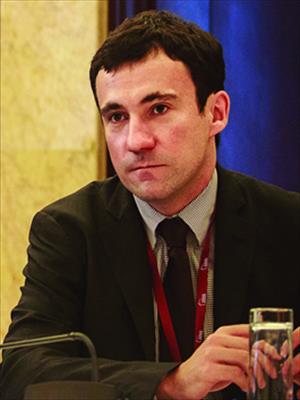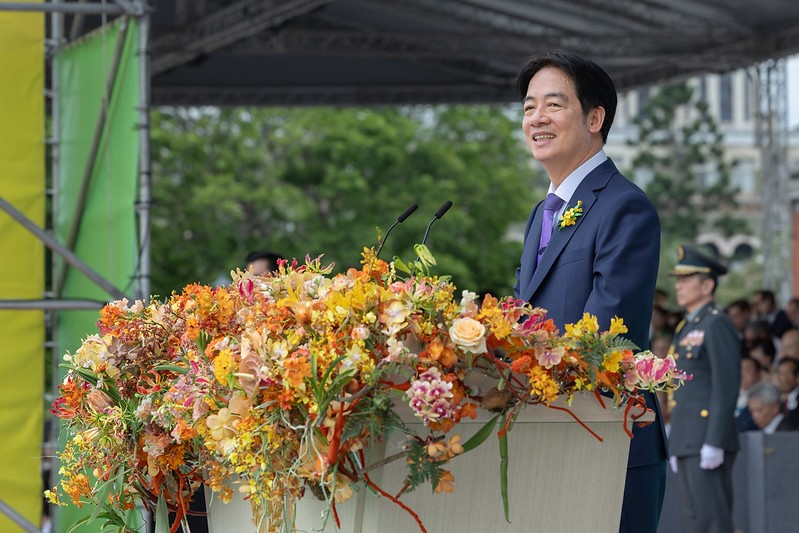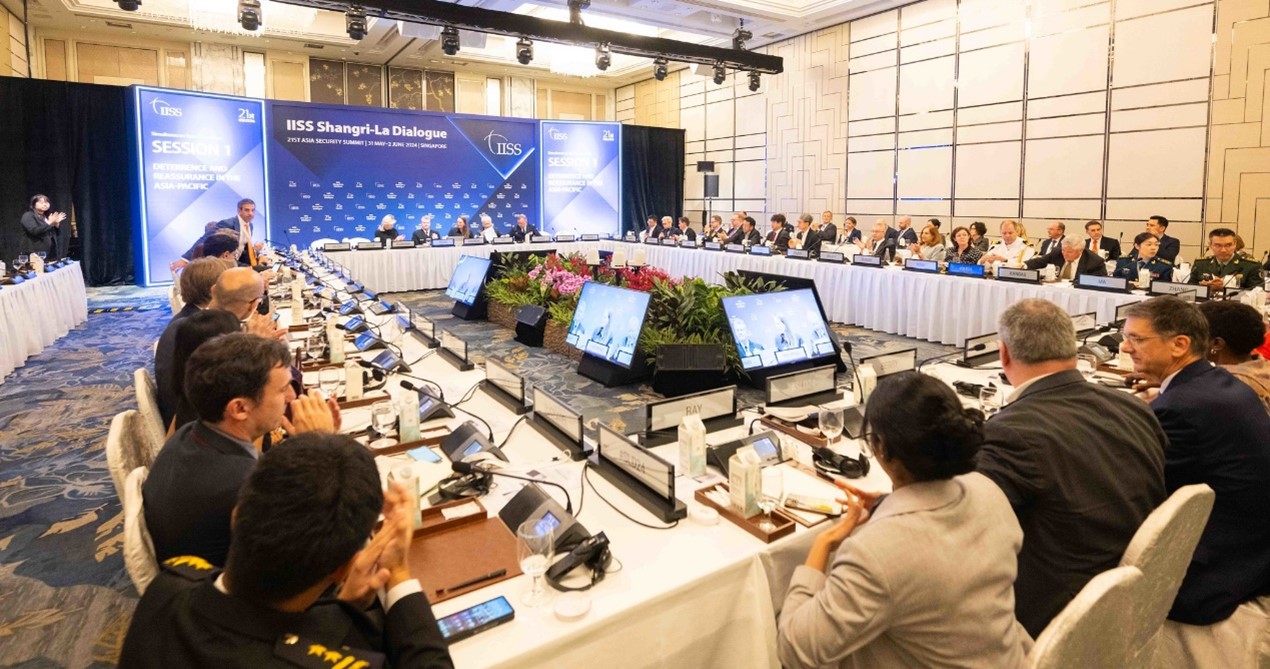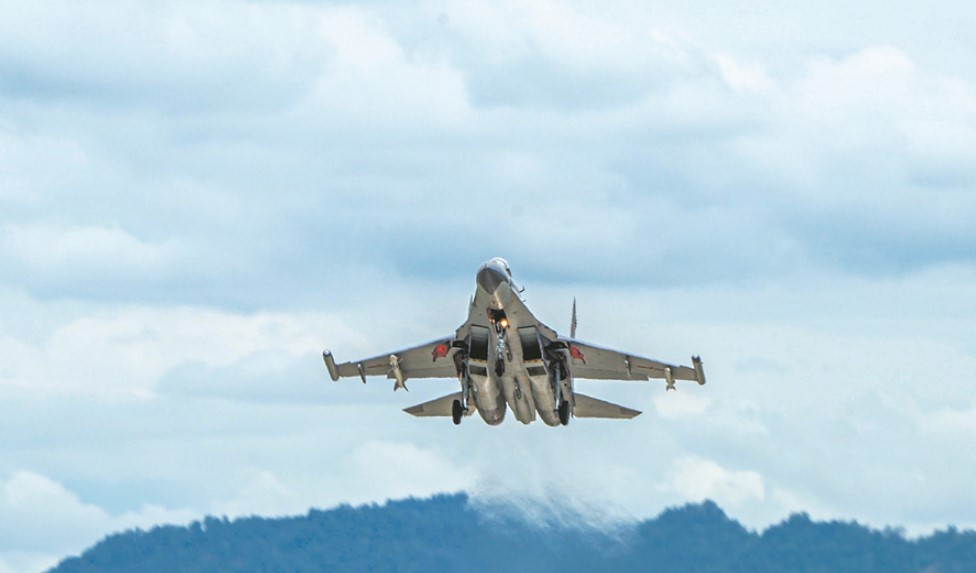China’s Response to President Lai’s Inauguration Speech: The Beginning of a Destabilization Campaign
China’s reaction to President Lai Ching-te’s inauguration speech has been a calculated effort to portray him as a destabilizing force to both the international community and its domestic audience. This response includes pointed statements from the Taiwan Affairs Office and the initiation of military exercises around Taiwan. In the coming months and years, China is expected to intensify this destabilization campaign. Picture source: Office of the President, Taiwan (ROC), May 20, 2024, Office of the President, Taiwan (ROC), https://www.president.gov.tw/News/28428.
Prospects & Perspectives No. 34
China’s Response to President Lai’s Inauguration Speech:
The Beginning of a Destabilization Campaign
By Mathieu Duchâtel
China’s reaction to President Lai Ching-te’s inauguration speech has been a calculated effort to portray him as a destabilizing force to both the international community and its domestic audience. This response includes pointed statements from the Taiwan Affairs Office (TAO) and the initiation of military exercises around Taiwan. In the coming months and years, China is expected to intensify this destabilization campaign.
Taiwan’s Status in the Inauguration Speech: No Notable Change
Regarding the status of Taiwan and the Republic of China, President Lai’s inauguration speech adhered closely to the Democratic Progressive Party’s (DPP) established position, as articulated in the 1999 Resolution on Taiwan’s Future. The resolution states, “Taiwan, although named the Republic of China (ROC) under its current constitution, is not subject to the jurisdiction of the People’s Republic of China (PRC).”
In 2024, it is easy to lose sight of how the 1999 Resolution on Taiwan’s Future was a historical watershed, marking the DPP’s formal shift from advocating for an independent Republic of Taiwan to maintaining the “status quo” in the Taiwan Strait. In many ways, the Resolution was primarily about broadening the DPP’s electoral base in preparation for the 2000 presidential election, three years after the Peng Ming-min/Hsieh Chang-ting ticket obtained only 21.13% in Taiwan’s first direct presidential election. The DPP calculated that the pro-independence clause of the party charter, which sought to establish “the Republic of Taiwan as a sovereign, independent, and autonomous nation,” was a major roadblock to victory, being seen by a majority of the electorate as reckless and unrealistic given Taiwan’s geopolitical environment. Hence, the 1999 Resolution on Taiwan’s Future was the formal recognition by the DPP that Taiwan is already an independent sovereign state whose official name is the Republic of China. The freeze of the DPP’s independence project, effectively turning it into a pro-status quo party, represented a concession in the name of electoral and strategic pragmatism for those in the Taiwan independence movement who consider the Republic of China an illegitimate or even colonial regime.
There is therefore absolutely nothing new in the way President Lai articulated his vision of Taiwan’s status in his inaugural address. The existence of the Republic of China, the reference to the ROC constitution, and its article stating that its sovereignty resides “in the whole body of citizens,” along with the objective description of the factual reality that the ROC and the PRC are “not subordinate to each other,” are views that are not only highly consensual in Taiwan but also enshrined in constitutional law.
Into the Nuances – Silences and Emotions
Despite this continuity, the TAO has aggressively framed President Lai’s rhetoric as indicative of his commitment to Taiwanese independence. The TAO’s portrayal of Lai as a “Taiwan independence worker” aims to alarm both domestic and international audiences by suggesting that his leadership could lead to increased instability in the Taiwan Strait, and by preemptively putting the blame for any deterioration of cross-strait relations on President Lai’s supposedly pro-independence agenda.
In Lai’s speech, there are indeed formulations and silences that Beijing has certainly found troubling, as both Kathrin Hille of the Financial Times and Amanda Hsiao of the International Crisis Group have already argued. Hille noted the use of “China” where former president Tsai Ing-wen would refer to the “Beijing authorities” or “the other side of the Strait,” thus refraining from explicitly highlighting the existence of two countries. She also noted Lai’s assertion that “the Republic of China and the People’s Republic of China are not subordinate to each other” as a statement former president Tsai “rarely” made; indeed, when president Tsai used that exact sentence in October 2021, the TAO responded with a statement criticizing this language as part of a “two-states theory” and plotting Taiwan independence.
The ICG’s Hsiao noted the disappearance in Lai’s speech of former president Tsai’s emphasis that Taiwan’s cross-Strait policy would be conducted “in accordance with the ROC constitution and the Act Governing Relations between People of the Taiwan Area and Mainland Area.” Interestingly, this language has become highly consensual in Taiwan, as both the KMT and the Taiwan People’s Party used it during the campaign. It was even mentioned in the joint statement concluding their short-lived attempt to form a joint presidential ticket. Could Lai use such language in future? It is not impossible.
One should add that the concluding remarks in Lai’s speech, which call for the “world to welcome a new Taiwan,” certainly have a stronger pro-independence connotation in Chinese than in English. However, speaking to the hearts of those in Taiwan who have a strong emotional attachment to Taiwanese identity and resent the limits placed by the Beijing on Taiwan’s international space certainly does not amount to preparing a declaration of independence.
Beijing’s Reaction
Lai’s use of the ROC constitutional framework to assert Taiwan’s sovereignty has elicited a strong reaction in Beijing, similar to when his predecessors used similar rhetoric. The use of the term 華獨 (ROC independentism) to describe Lai’s agenda is interesting in that regard, given that it only emerged during the presidency of Ma Ying-jeou. To use the PRC’s standard terminology opposing both “Two Chinas” and “One China, one Taiwan,” Beijing sees President Lai as using the ROC constitution as a facade to push for Taiwanese independence — a “fake ‘two Chinas,’” where the real goal is to achieve “one China, one Taiwan.”
By painting Lai as a provocative figure, China seeks to shape the perceptions of its domestic and international audiences. This is the beginning of a campaign to undermine President Lai’s credibility in order to delegitimize his authority and international standing. The campaign should be expected to be sustained and even intensified whenever there is an opportunity to exploit.
What Beijing chooses to miss, of course, is that Lai’s acceptance of the ROC constitutional framework, which states that Taiwan is the “free area” of the Republic of China, could provide common ground for co-managing the status quo, potentially opening a window for dialogue and cooperation.
Conclusions
President Lai has received a democratic mandate to defend the status quo in the Taiwan Strait. By portraying him as a dangerous troublemaker, Beijing aims to shape a political environment in Taiwan in which a governance crisis could erupt; and an international environment in which Taiwan’s government is seen as the side challenging the status quo. This strategy may partly succeed in convincing new audiences internationally and will pose a major challenge to President Lai’s national security team. For Taiwan’s executive branch, the key strategic question is whether it is useful or not to provide some assurances to Beijing regarding Taiwan’s future trajectory and how cross-strait policy will be conducted by Taipei. It seems that so far, the Taiwanese government has made a strategic decision that such assurances are not particularly helpful. The international environment could lead to a reconsideration of this conclusion — if this has indeed been a conclusion, and not simply a test of Beijing’s reaction.
(Dr. Mathieu Duchâtel is Resident Senior Fellow for Asia and Director of International Studies, Institut Montaigne.)




